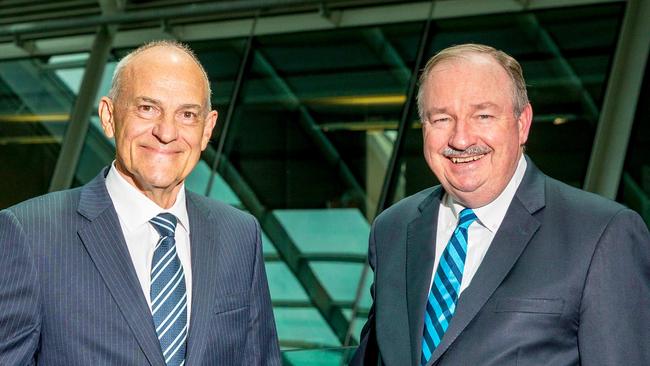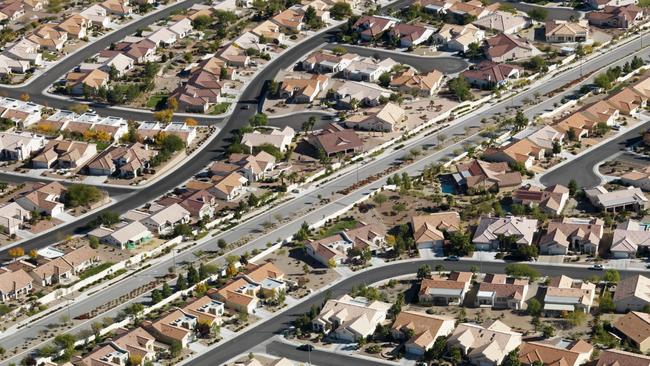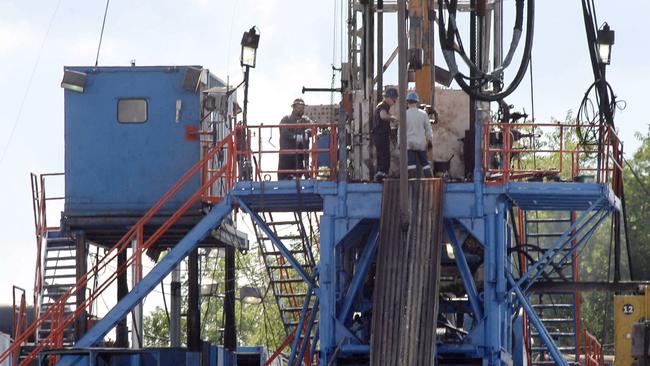Building group Boral’s billion-dollar poser
THE retail shareholders of Boral have until Friday week to collectively make a near half-billion-dollar decision: do they back the company’s $3.5 billion plunge into Donald Trump’s America, asks Terry McCrann.
Terry McCrann
Don't miss out on the headlines from Terry McCrann. Followed categories will be added to My News.
THE retail shareholders of Boral have until Friday week to collectively make a near half-billion-dollar decision: do they back the company’s $3.5 billion plunge deep into Donald Trump’s America?
In contrast to the company’s institutional shareholders, they have the luxury of time — an extra two weeks or so to assess the move, to see the market reaction to the move, and indeed to see how the broader market, both here and critically in the US, is behaving.
The instos had barely 30 hours after the $3.5 billion deal was announced to make their decisions to commit a total of more than $1.5 billion.
Further, they had to do it “in the dark”, with Boral shares suspended; retail holders get to watch both what the instos did and then trading in Boral over (up to) 13 subsequent days before their decision.
The one thing that is clear and undeniable is that “the market” (a term I dislike, is as misleading as “the people spoke/voted” in an election, but has its broad uses) has “voted” decisively against the move.
Boral shares have been sold down, stripping a thumping $750 million, or 16 per cent, from its pre-deal market value — and done so, in an overall market which has actually risen 2 per cent over that time.
The first big question is the proposed deal itself. It is clearly a company-making — or breaking — move. A $4.6 billion (now reduced to less than $3.9 billion) company is spending $3.5 billion to buy another, Headwaters.

In doing so, Boral is betting the bank on the US in both the short and long terms. In the first instance it is punting on a quick pay-off from President Trump’s big-spending promises. But more importantly and more fundamentally, it is betting the company’s long-term growth on the US.
In the first instance Boral’s Australian businesses will remain more than 50 per cent of the overall group. But with limited growth opportunities even in an Australia that sustains high population growth rates, clearly more of group growth will have to be found in the US.
In betting $3.5 billion upfront, Boral is implicitly committing to direct more capex and/or business-acquiring dollars across the Pacific in future years. Just as BHP Billiton’s $20 billion-plus initial plunge into US shale required it to follow through with more billions of dollars of annual spends after that.
Uh-oh: while Boral is not in the same league — we are talking hundreds of millions in future years not billions — it does raise two separate but overlapping, decidedly awkward, questions.
First, the record for these sorts of “company-making deals” is not a great one. They usually are great for target holders who get a premium price; not so great for holders in the buying company, as we have already seen over the past week.
Secondly, the record over the past four decades or so, of Australian companies making acquisitions overseas, is patchy at best and arguably value-destructive in most cases. So if you put the two together, for a company to embark on a company-making move and to embark on it in another country, it is really tempting fate — or perhaps just plain old reality.

As I wrote last week, the move arguably makes great business sense.
It will deliver Boral scale in the biggest developed market in the world.
If it wants to be in the US, it really does have to bulk up. The alternative would have been to walk away from the US and to focus on organic growth in Australia and more modest moves into Asia.
Now, as to the issue and the retail holder decision. Before Boral unveiled its — clearly market-surprising — move, its shares had closed at $6.15. Yesterday they were at $5.02.
IT is important to understand that the $5.02 incorporates the full impact of both the entitlement offer, for both instos and retail holders, and the accompanying placement Boral made to instos.
The entitlement offer was one new share at an issue price of $4.80 for every 2.22 shares held. The placement of a further 94 million shares was also at the $4.80.
Assuming a neutral reaction, Boral shares should have fallen to $5.65 after both the issue and the placement. The drop to $5.02 adds to that $750 million loss of value.
Now, as we have discussed so often before, the placement provides a special benefit to the instos, and is not only unfair to retail holders but requires them to pay for that benefit.
If the shares had stayed at $5.65 that would have been significant.
Arguably that’s balanced to some extent by the instos having to commit “in the dark”, and so guaranteeing the company the money — a benefit to all holders; while the retail get that extra time.
Anyway, at $5.02, the benefit to the instos is marginal. They were able to buy an extra 94 million shares at the $4.80 discounted price. They’ve picked up, so far, 22c a share or just $21 million in total.
In overall terms it works like this. Before the move Boral had a market value of $4.57 billion. One way or another holders (or the underwriters) will subscribe $2.05 billion of fresh capital.
The company “should” have then been worth $6.62 billion; at $5.02 it’s only worth $5.87 billion; some $750 million has evaporated.
In individual terms (at $5.02), the average insto has suffered a 10.8 per cent after-issue loss of value; the average retail holder a 12.6 per cent loss. That’s the cross-subsidy from the placement.
Those retail holders have nine days to decide: do they buy more Boral shares at $4.80. At $5.02 the answer is yes, but it’s a very fine margin, although you could lock in that margin (subject to tax) by selling as many shares now as you intend to subscribe for.
There is, though, a further twist, which will only be resolved well after the die is cast. It’s not a done deal; it is subject to a number of US regulatory approvals. It’s probably a very small probability, but what if it falls over?
While Boral couldn’t just “undo” these capital raisings; presumably it would have to find some way of returning capital to holders. And in that situation would its share price neatly reclaim the lost $750 million?
Some interesting things for retail holders to ponder over the next eight days.

THE GASSY RENEWABLE
YOU really can’t make this stuff up: where does the “normal” mindless stupidity leave off and the Kool-Aid-fuelled global warming religious hysteria take over?
On Tuesday, I exposed the “Big Lie” pedalled by the supposedly upmarket The Economist magazine that renewables had overtaken coal as the world’s major electricity source. If true, what are we talking about? Problem solved.
In response to my article, one of our columnists, Ed Shann, has pointed out a really delicious paragraph in The Economist’s “authoritative” analysis that terms like “self-delusion” and “lack of self-awareness” can’t begin to describe.
“The growth of renewables has helped cut America’s emissions from power generation by around a quarter since 2005. The main reason for that progress, an abundance of cheap shale gas ...”
So in the overheated world of the “anything but coal” hysterics at The Economist, that hydrocarbon, CO2-releasing gas is miraculously transmogrified into a “renewable”.
As I wrote, they lie even when they don’t know it. It’s as if their brains have already been fried.
Originally published as Building group Boral’s billion-dollar poser


